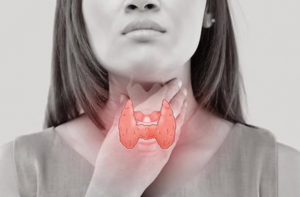Hashimoto’s: An overlooked, primary cause of resistant weight loss
 A common scenario I see in my office, time and time again, is a female patient who has been diagnosed with hypothyroid disease, treated with medication, and still suffers with the many symptoms of a low thyroid, including fatigue, depression, loss of ambition, brain fog, joint stiffness, muscle cramps, constipation, dry skin, hair loss, hormonal irregularities, feeling cold, and an inability to lose weight. My patients often wonder why they still don’t feel good despite being told by other physicians that their lab values are all “normal”. My next question is usually, “Did your primary care provider run a complete thyroid blood panel, including antibody testing, to more accurately assess thyroid function?” The traditional testing of the thyroid is usually limited to a single TSH level, which only provides a general, overall picture of an overactive or underactive thyroid gland, but doesn’t address the root cause of the dysfunction or problem. A more accurate panel would also include the Free T4, Free T3, TPO (thyroid peroxidase), and TG (thyroglobulin) antibody tests. To better understand what these markers measure, let’s take a look at how the thyroid works.
A common scenario I see in my office, time and time again, is a female patient who has been diagnosed with hypothyroid disease, treated with medication, and still suffers with the many symptoms of a low thyroid, including fatigue, depression, loss of ambition, brain fog, joint stiffness, muscle cramps, constipation, dry skin, hair loss, hormonal irregularities, feeling cold, and an inability to lose weight. My patients often wonder why they still don’t feel good despite being told by other physicians that their lab values are all “normal”. My next question is usually, “Did your primary care provider run a complete thyroid blood panel, including antibody testing, to more accurately assess thyroid function?” The traditional testing of the thyroid is usually limited to a single TSH level, which only provides a general, overall picture of an overactive or underactive thyroid gland, but doesn’t address the root cause of the dysfunction or problem. A more accurate panel would also include the Free T4, Free T3, TPO (thyroid peroxidase), and TG (thyroglobulin) antibody tests. To better understand what these markers measure, let’s take a look at how the thyroid works.
The thyroid is a butterfly shaped gland found in the front of your neck and produces hormones that regulate metabolism in nearly every cell of your body. These hormones, including T4 and T3, intimately interact with other hormones like cortisol (a stress hormone), insulin (a pancreatic hormone that regulates blood sugar levels), and the sex hormones (progesterone, estrogen, and testosterone). This is why a poor thyroid function is related to so many symptoms and conditions. Nearly 90 percent of the hormone produced by the thyroid is T4, which is almost completely inactive. The body must convert this inactive T4 to its active form, T3, in order to have normal metabolism in the cells. If both T4 and T3 are not tested, we won’t know how well your body is making this conversion, and just prescribing the standard synthroid, or another T4 medication, won’t be effective in treating your symptoms. So you can see why it’s important to not only know your TSH levels, but also your T4 and T3 levels in order to determine if your thyroid is truly underactive, or if your body is just unable to make T3 adequately.
These thyroid hormones can be suboptimal due to stress, nutritional deficiencies, allergens, toxins, or chronic low grade infections. The root cause must be discovered in order to effectively treat the related symptoms of hypothyroid.
Another misdiagnosed cause of thyroid disorder is an auto-immune thyroid. This occurs when your immune system attacks and destroys the thyroid, resulting in a low functioning gland. What most people are unaware of is that 90-95 percent of all cases of hypothyroid in the United States are caused by this auto-immune condition. This is also referred to as Hashimoto’s and can only by ruled out by testing negative for the TPO and TG antibodies, as discussed earlier. This abnormal process of destroying self tissue can begin rather silently, and effective treatment must address this dysfunctional immune component in order to stop the complete destruction of the thyroid. Treatment will include identifying nutritional deficiencies, food sensitivities, underlying infections, exposure to toxins, and addressing causes of chronic stress.
I know this may sound complicated, but in summary, it is estimated that 10-40 percent of Americans have a low functioning thyroid, called hypothyroid, with the majority caused by an auto-immune condition known as Hashimoto’s. Traditional testing only includes a TSH test, which is insufficient in finding the root cause of a low functioning thyroid. Finding a doctor, nurse practitioner, or a physician specializing in functional medicine, and asking them to add the following tests: Free T4, Free T3, TPO, and TG antibodies, will allow a complete look at thyroid function, discovering the actual cause, and aid in the resolution of symptoms, including fatigue, depression, constipation, and weight gain.
Dr. Laura Korman, of Korman Relief & Wellness Center, accepts patients who care about their health and are willing to take control of their health destinies. She is a Diplomate of the American Clinical Board of Nutrition and has over 600 post doctorate classroom hours in nutrition.
Dr. Korman can meet with you remotely or at her Port Charlotte, Florida clinic. Please visit Dr. Korman’s website at www.drlaurakorman.com to learn so much more about so many things!
Laura R. Korman, DC, DACBN
Korman Relief & Wellness Center
16954 Toledo Blade Blvd
Port Charlotte, FL 33954
941-629-6700
Email: drlaurakorman@gmail.com









